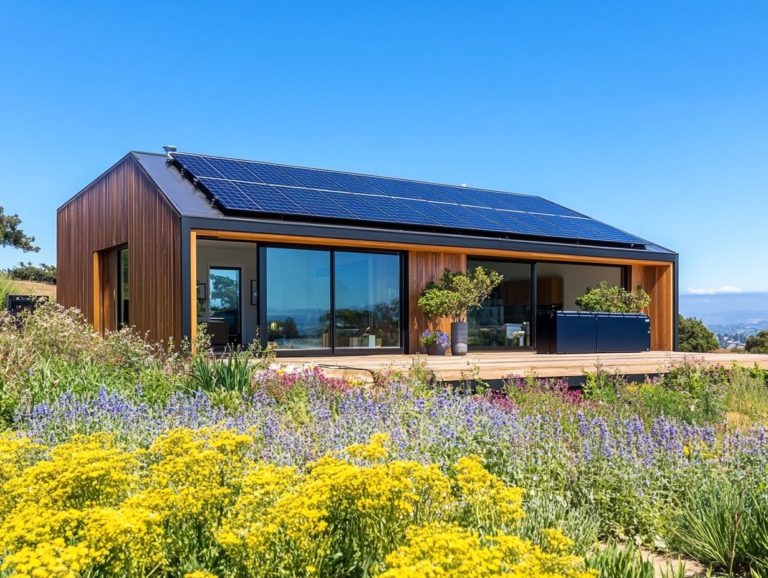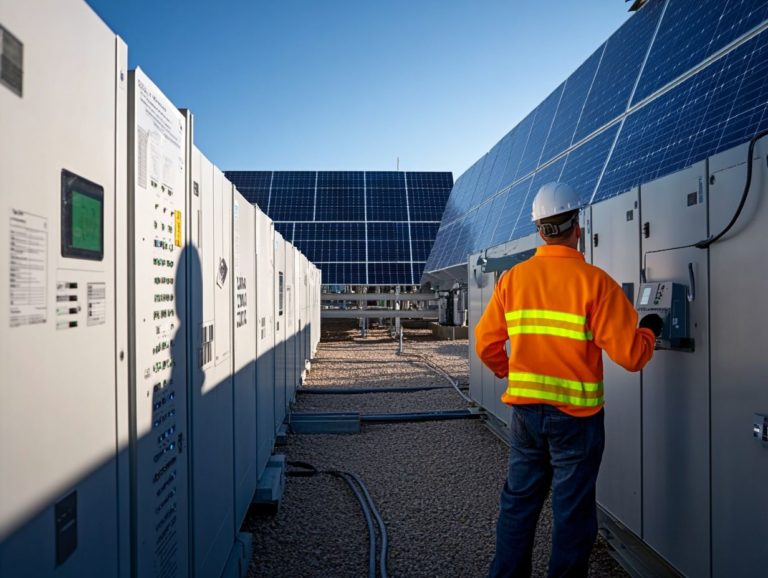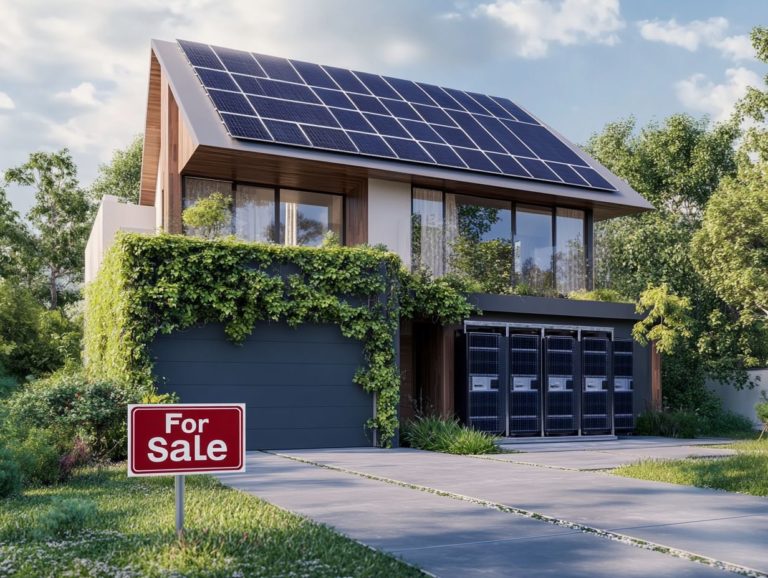5 Features to Look for in Home Battery Systems
In a time when renewable energy and energy independence are becoming paramount, home solar battery systems are capturing the attention of discerning homeowners like yourself.
These systems do more than just store energy; they also serve as a reliable backup power source during outages, making them a savvy investment for your home.
This article delves into five essential features to consider when selecting a home battery storage system:
- Total capacity
- Power output
- Compatibility with solar panels
- Warranty and maintenance
- Smart home integration
By grasping these crucial factors, you can make an informed decision that aligns perfectly with your energy needs and lifestyle.
Contents
- Key Takeaways:
- 1. Capacity and Storage
- 2. Power Output
- 3. Compatibility with Solar Panels
- 4. Warranty and Maintenance
- 5. Smart Home Integration
- What Is a Home Battery System and How Does It Work?
- Frequently Asked Questions
- What Are the Top 5 Features to Look For in Home Battery Systems?
- Why Does Battery Capacity Matter for Your Home?
- Why Is Inverter Compatibility an Important Feature to Consider?
- What Should You Look For in Terms of Warranty and Lifespan for a Home Battery System?
- Are Smart Monitoring and Control Capabilities Necessary for a Home Battery System?
- Can home battery systems work with renewable energy sources?
Key Takeaways:
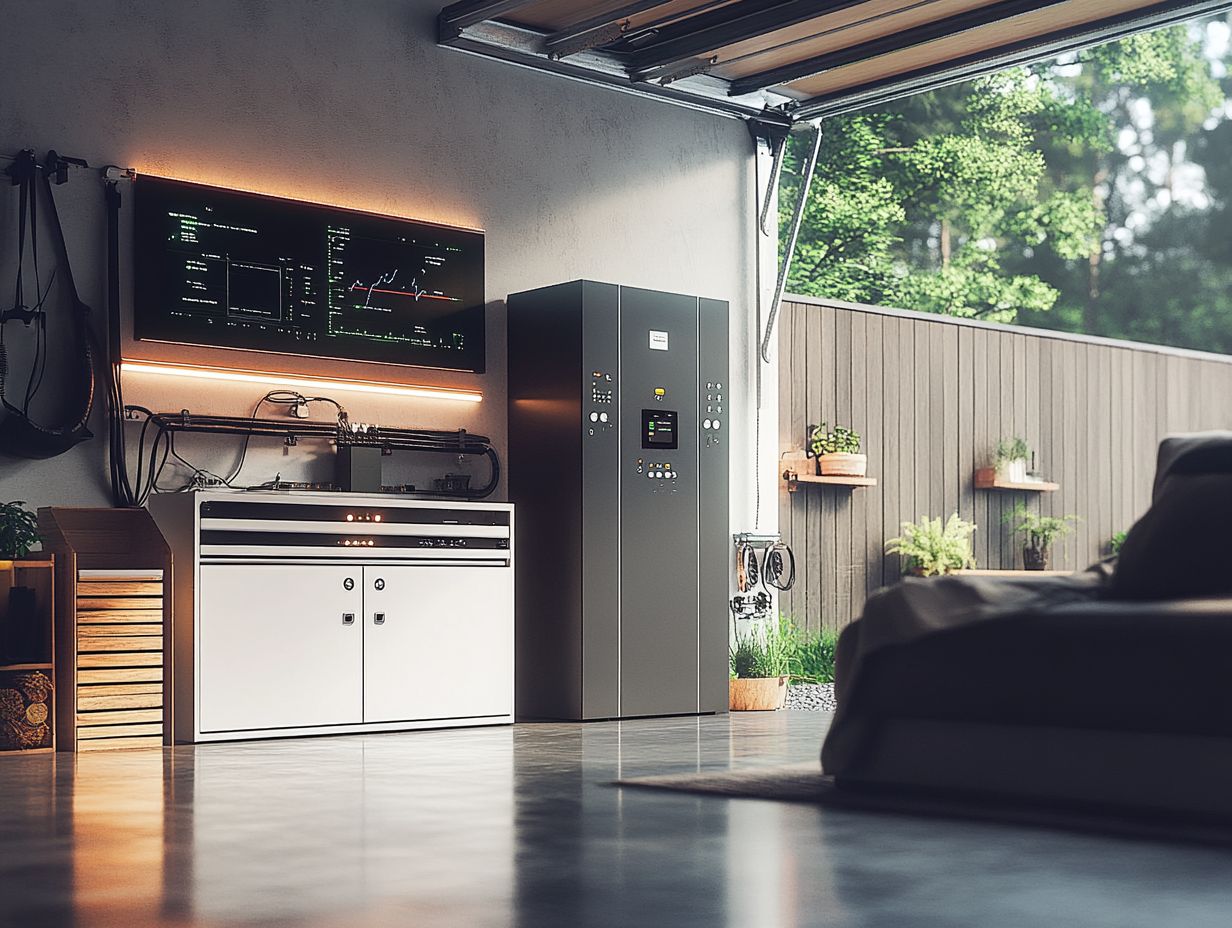
- Capacity and storage determine how much energy a home battery system can store. Choose one that meets your household’s needs.
- Power output affects how much energy a system can deliver at once. Consider your daily energy consumption when selecting a system.
- If you have solar panels, ensure compatibility with the home battery system to maximize renewable energy benefits and potentially lower utility bills.
1. Capacity and Storage
Capacity and storage are crucial elements of home solar systems. They determine how much solar energy you can harness, store, and use.
This impacts your energy management and reduces reliance on the grid.
Understanding the total capacity of your solar battery whether it s lithium-ion, lead-acid, or flow batteries provides insights into how effectively you can store energy for backup power during outages.
This knowledge helps you optimize your use of stored energy, cutting down on energy costs and minimizing your carbon footprint.
Each battery type brings unique benefits that influence capacity and storage efficiency. For instance, lithium-ion batteries offer high round-trip efficiency, meaning you can retrieve more stored energy when needed.
Lead-acid batteries may be more budget-friendly upfront but typically have lower capacity and shorter lifespans. Flow batteries can deliver consistent power for longer periods, making them ideal for significant backup needs.
Consider these factors carefully to make the best choice for your energy needs!
2. Power Output
Power output is a vital element of home battery systems. It shapes how effectively you can harness solar energy in real-time, whether powering your appliances or providing backup during outages.
It s important to understand the intricacies of power output, which includes both peak power and continuous output.
Peak power indicates the maximum energy your system can deliver in short bursts, while continuous output reflects the steady power available over extended periods.
Knowing these distinctions is crucial when assessing your energy needs. High-demand appliances may require more peak power, impacting your overall energy consumption patterns.
This understanding helps ensure that your system is sized appropriately, providing reliable energy on those less sunny days.
Explore your options today to secure your energy future!
3. Compatibility with Solar Panels
The compatibility of home battery systems with solar panels is essential for getting the most out of your energy use and ensuring that your energy production integrates seamlessly into your home s energy ecosystem.
Understanding the differences between AC-coupled and DC-coupled systems can greatly affect how effectively you store and consume energy. An AC-coupled system converts energy to alternating current after generation, making it easier to connect with traditional grid setups.
On the other hand, a DC-coupled system connects the solar panels directly to the battery, which can boost efficiency by reducing energy loss during conversion. This makes it an attractive option for energy management. For example, systems like SolarEdge Home leverage DC coupling to optimize energy flow from the panels to the batteries, ultimately leading to savings and enhanced performance.
This smart compatibility makes managing your energy a breeze and elevates the overall sustainability of your home, especially when you consider 5 ways to optimize your home energy storage.
4. Warranty and Maintenance
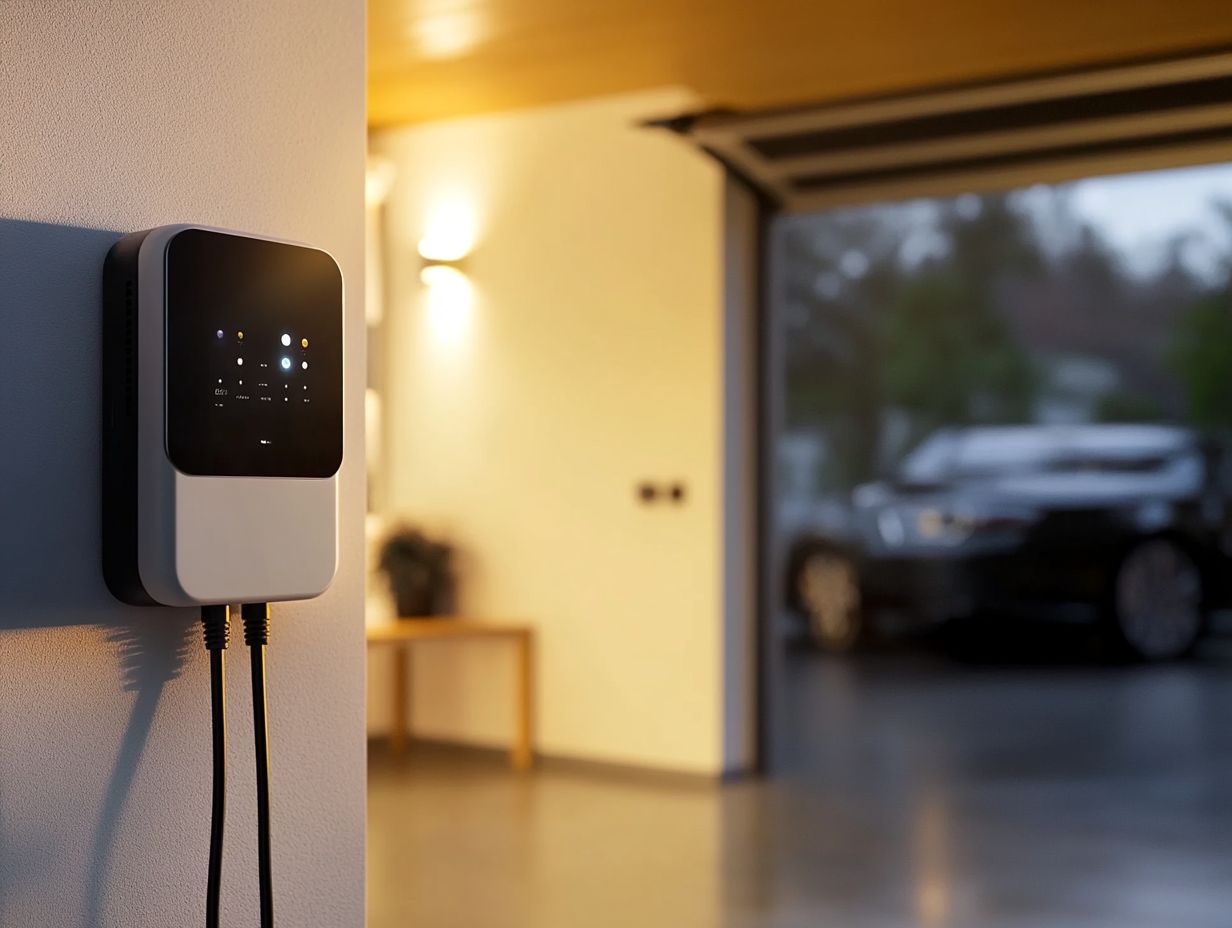
Understanding warranty and maintenance requirements for home battery systems is crucial for ensuring long-term performance and reliability. This directly impacts your investment in renewable energy and your energy costs.
Typically, these warranties span from 5 to 15 years, covering defects and providing you with peace of mind as a homeowner. It’s vital to regularly maintain your system to avoid costly repairs and ensure that all safety features remain effective.
The lifespan of your battery can significantly influence your overall expenses. Longer-lasting batteries could mean reduced replacement costs down the line.
Explore available government incentives to help offset your initial investments, making your transition to renewable energy not only eco-friendly but also economically sound.
5. Smart Home Integration
Smart home integration offers a revolutionary way to manage your energy use. It allows you to optimize efficiency through advanced management software and smart appliances seamlessly woven into your home energy systems.
By interacting effortlessly with energy management systems, these cutting-edge technologies enable you to monitor and control your energy consumption in real time. For instance, smart thermostats can autonomously adjust heating and cooling based on your occupancy patterns.
Meanwhile, energy-efficient smart lighting can be programmed to switch off when a room is empty. Imagine virtual power plants that aggregate energy from multiple homes, enabling you to sell any excess energy back to the grid.
This dynamic interplay not only boosts your home’s overall efficiency but also significantly slashes your energy bills. This creates a meaningful impact on both your household budget and the environment.
What Is a Home Battery System and How Does It Work?
A home battery system is a vital part of contemporary energy solutions. It is designed to store solar energy for later use, provide backup power during outages, and optimize your household’s energy needs, ultimately reducing your reliance on traditional grid sources.
These systems typically comprise several key components, including batteries, inverters—devices that convert stored energy into usable electricity for your home—and a management system that regulates energy flow. For a deeper understanding, consider exploring understanding lithium-ion batteries for homes.
The operation can vary depending on the configuration. For instance, AC-coupled systems connect seamlessly with existing solar panel setups, offering flexibility and compatibility, while DC-coupled systems convert energy directly from solar panels to storage, often resulting in higher efficiency. For those considering energy solutions, exploring 5 energy storage options for rural homes can provide valuable insights.
Understanding these differences is essential for anyone looking to enhance their energy independence and ensure a reliable power supply when conventional sources falter.
Don t wait enhance your home’s energy efficiency today!
What Are the Benefits of Having a Home Battery System?
Investing in a home battery system offers you a wealth of benefits, such as enhanced energy efficiency, backup power during outages, reduced energy costs, and a smaller carbon footprint. It s a smart choice for homeowners who care about the environment.
You can fully harness these advantages by integrating a battery storage solution—a system that allows you to save energy for later use with your solar energy setup. This enables you to store excess sunlight for those peak hours when electricity rates skyrocket. To get the most out of your energy storage units, consider following 5 essential tips for maintaining energy storage units. Not only does this diminish your reliance on the grid, but it also translates into significant savings on your utility bills.
Imagine having stored energy to draw from during power outages, ensuring your essential appliances stay up and running. This gives you peace of mind, particularly in areas prone to harsh weather.
Using sustainable technologies benefits both you and the environment. By significantly lowering greenhouse gas emissions, you contribute to the broader shift toward renewable energy, making a meaningful impact for future generations.
How Can a Home Battery System Save Money on Energy Bills?
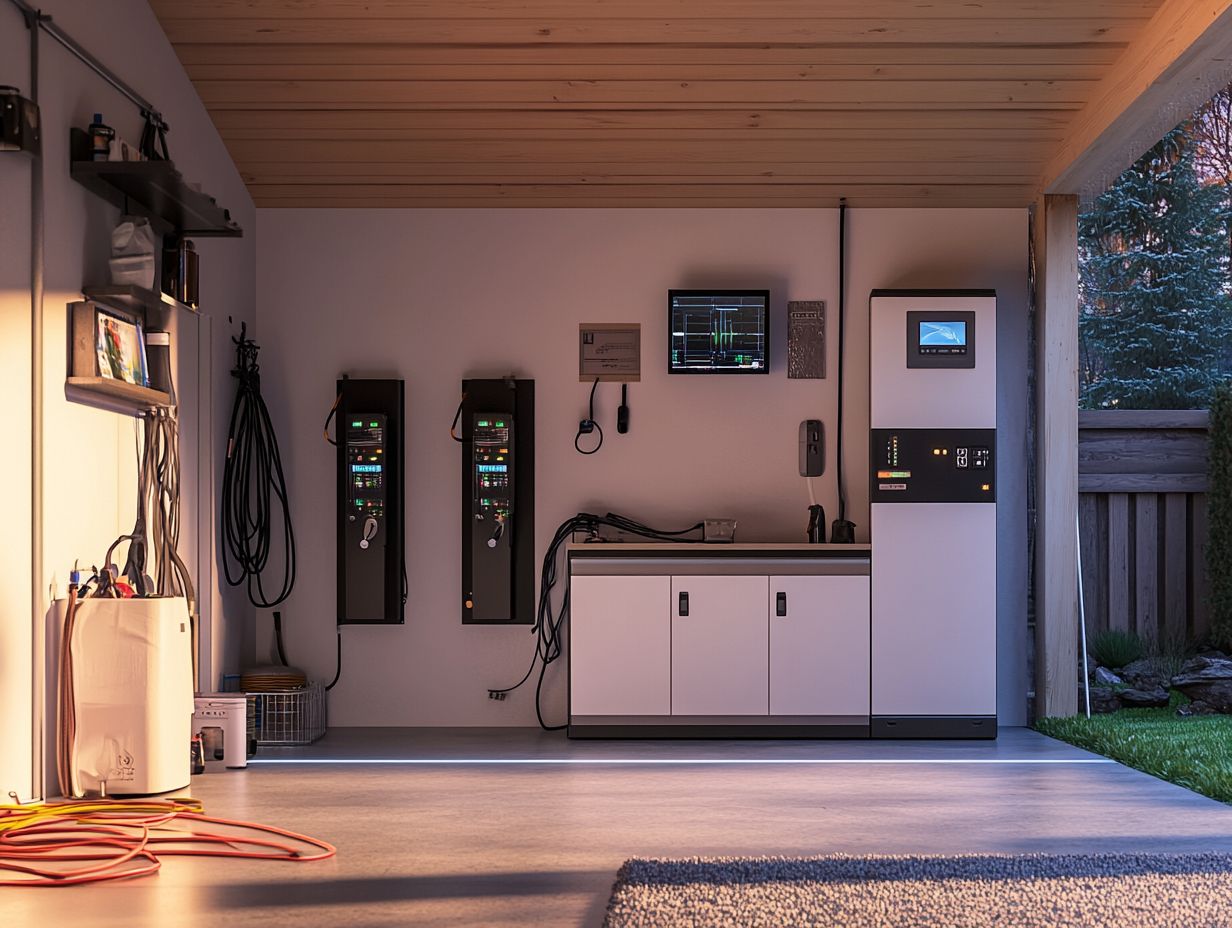
A home battery system can be a game-changer for your energy bills, allowing you to harness and self-consume stored solar energy, especially during those peak times when electricity prices soar.
By optimizing your use of stored energy during these high-cost periods, you can significantly lessen your dependence on the grid, which tends to charge more during the evening when demand spikes. For example, if your local utility charges $0.30 per kilowatt-hour during peak hours, tapping into that stored energy can lead to impressive savings.
Adopting energy management strategies that focus on charging your battery during off-peak times enhances both efficiency and cost-effectiveness. This approach not only reduces your monthly expenses but also fosters a more sustainable energy consumption pattern, ultimately benefiting both your household budget and the environment.
What Are the Different Types of Home Battery Systems?
Home battery systems present a variety of options, including lithium-ion batteries, lead-acid, and flow batteries. Each type has its own unique characteristics and advantages, designed to meet diverse energy storage needs and preferences.
Understanding the differences among these alternatives is essential for anyone aiming to optimize their energy usage. Lithium-ion batteries stand out for their remarkable ability to store a lot of energy relative to their size, and they often last over a decade with minimal capacity loss. This makes them ideal for frequent use and high-demand applications, including backup power during power outages. For a comprehensive overview, consider comparing battery types for home energy storage.
Conversely, while lead-acid batteries are generally more budget-friendly, they come with a shorter lifespan and lower energy capacity, making them a more cost-effective choice for occasional use. Flow batteries, with their scalable design and enhanced safety features, offer flexibility but are typically better suited for larger-scale or commercial energy storage solutions, including solar energy applications. Exploring 10 ways to save money with energy storage can also provide valuable insights into optimizing your energy use.
By considering these factors, including total capacity and battery preferences, you can make informed decisions that align perfectly with your specific requirements. Don’t miss out on the opportunity to invest in a home battery system that complements your lifestyle and explore 5 smart energy solutions for modern homes!
What Are the Key Factors to Consider When Choosing a Home Battery System?
When selecting a home battery system, consider several key factors, including battery types, total capacity, energy efficiency, and safety features. These elements directly impact performance and how well they suit your energy needs.
Understanding your household’s specific energy consumption patterns is crucial. It helps you choose a system that meets your storage requirements and aligns with your peak usage times. Evaluate criteria such as discharge rates to see how effectively the battery performs during high-demand periods.
Assess the lifespan and warranty of the system to ensure long-term reliability and peace of mind.
Integrating renewable energy sources, like solar panels, can enhance the efficiency of these systems. Explore how well the battery complements your existing or future energy solutions by reviewing the pros and cons of home battery systems to make an informed choice.
What Are the Common Misconceptions About Home Battery Systems?
Despite rising popularity, misconceptions about home battery systems linger. Many homeowners underestimate their energy efficiency, capabilities, and potential cost savings through government incentives.
You might think these systems are prohibitively expensive, but various financing options and incentives can make them accessible. The idea that home battery systems are only useful in off-grid situations overlooks their ability to optimize energy usage during peak times, ultimately leading to lower utility bills and allowing homeowners to enjoy the top benefits of energy storage.
Many assume they demand excessive maintenance. However, modern batteries are engineered for longevity and require minimal upkeep. By understanding the true potential of these systems, you can make informed decisions about your energy management and investment strategies.
Frequently Asked Questions
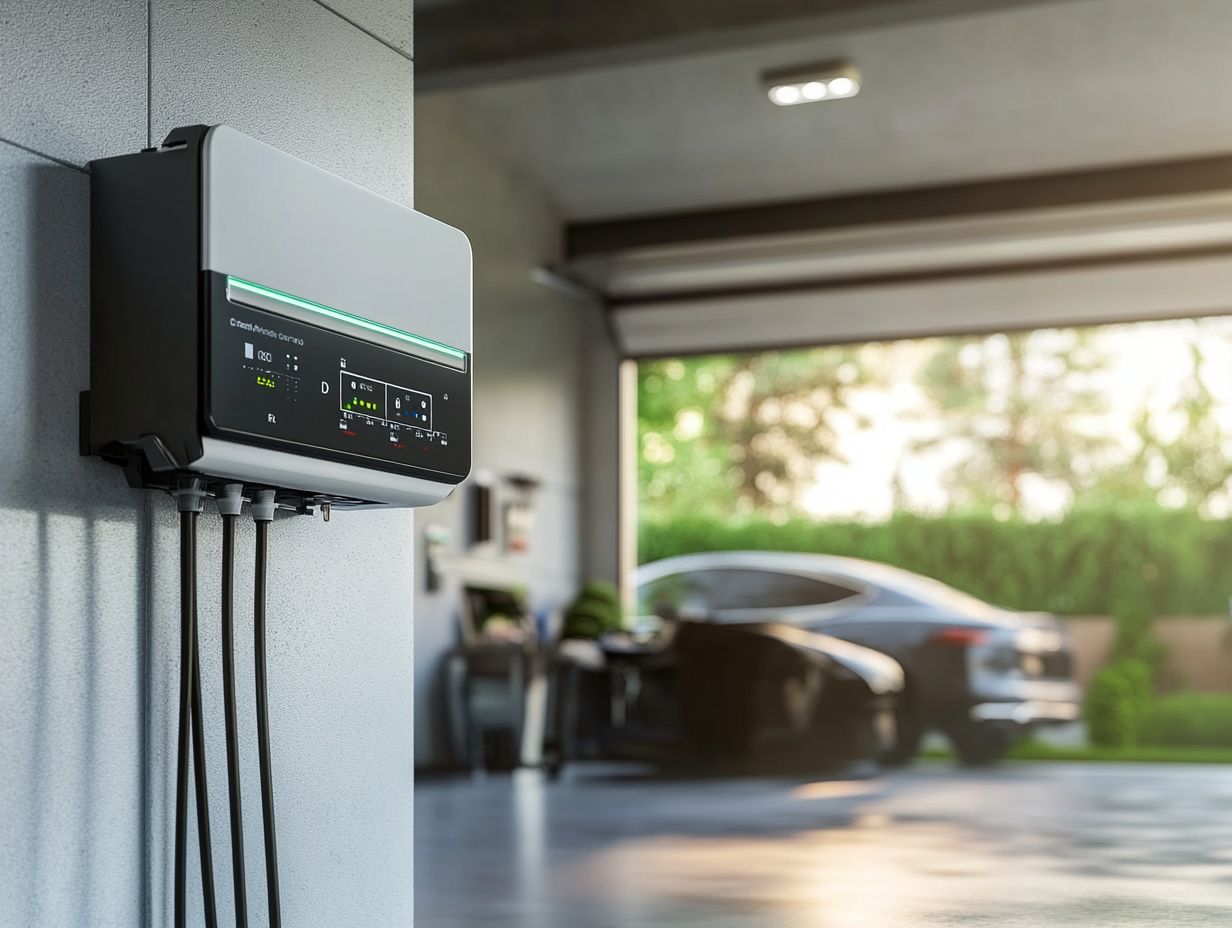
What Are the Top 5 Features to Look For in Home Battery Systems?
The top 5 features to look for in home battery systems are:
- Battery capacity and storage
- Inverter compatibility
- Warranty and battery lifespan
- Smart monitoring and control capabilities
- Integration with renewable energy sources
Why Does Battery Capacity Matter for Your Home?
Battery capacity and storage are crucial factors when choosing a home battery system. The higher the capacity and storage, the longer the system can provide backup power during outages or store energy from renewable sources for later use.
Why Is Inverter Compatibility an Important Feature to Consider?
Inverter compatibility is essential because it allows the battery system to connect to your home’s electrical system and convert stored energy into usable AC power. Without a compatible inverter, the battery system cannot provide backup power or integrate with renewable energy sources.
What Should You Look For in Terms of Warranty and Lifespan for a Home Battery System?
Choosing the right system is crucial for your peace of mind! Seek out battery systems with at least a 10-year warranty and a lifespan of 15-20 years. This ensures your investment will last and provide reliable backup power for many years.
Are Smart Monitoring and Control Capabilities Necessary for a Home Battery System?
While not a necessity, smart monitoring and control capabilities offer added convenience. These features allow you to monitor energy usage, track battery levels, and control charging and discharging remotely through a smartphone app.
Ready to choose your home battery system? Explore your options today!
Can home battery systems work with renewable energy sources?
Yes! Many home battery systems can work with renewable energy sources like solar panels or wind turbines.
This setup allows you to store extra energy for later use. It also helps you depend less on the grid and can significantly lower your energy costs over time!

